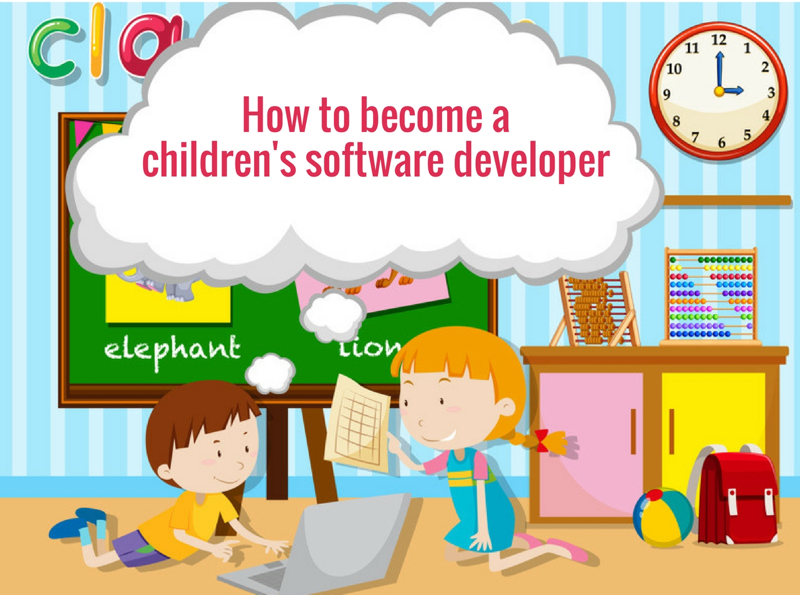How do I become a Children’s Software Developer?
Find your perfect college degree

Technology is not just an important part of modern adult life, but a crucial part of education as well. Children must be prepared to succeed in a world where technology is an integral part of their careers and their daily existences. Schools are using technology in an ever-expanding range of ways, including standardized testing, communicating with parents, tracking student progress, and daily classroom learning. Children’s software developers develop games, application, and other software programs for children. These products help children to learn and grow to be successful adults.
The duties of a children’s software developer vary by their specialty, but all fields generally include:
• Consulting with schools and other organizations to determine their needs in a software programs and apps
• Developing software systems or applications that meet these needs
• Leading and working with teams of software engineers to meet these goals
• Planning testing of both the software integrity and its ability to be used by children
• Modifying software to meet new standards and integrate with the latest technologies
Educational and Training Requirements
Children’s software developers must be specialists in two fields: software development and child development. They design software, which requires a bachelor’s degree in a field related to computer science. Most also have internships and practical experience, because computer science is a rapidly changing field where practical skills are as important as education. Accredited programs will include training in:
• Math, usually including calculus and linear algebra
• At least one year of physics
• Computer programming languages
• Operating systems
• Child development stages
• How children learn and process information
• Different forms of educational testing and lesson plans
• The benefits and drawbacks of various learning environments
• Working in teams
• Preparation to pass certification exams such as the Accreditation Board for Engineering and Technology, or ABET, exam
• Turning abstract educational concepts into concrete lessons or tests
In addition to at least a bachelor’s degree, many successful children’s software developers also have additional certifications in different programming languages. Most specialize in either application development or systems software development and have at least one certification in their desired field.
Children’s software development is a field where training and experience are just as important as education. Many students pursuing this career take internships or other types of non-academic training that allow them to display their creativity and abilities to work in the field. In addition, some colleges and universities help students to complete a large capstone project that shows off their skills and talents. These experiences are very important to employers in this field and will give new graduates an immense advantage.
Children’s software developers must also know about the children that they hope to educate and entertain with their products. Thus, most developers in this niche field have a degree in early child education or significant college coursework in fields related to child development in addition to education in computer science. Many start out as teachers or other education professionals and then get training in software development. The best developers are usually those that have worked with children in an educational setting and are aware of what programs would enrich the learning experience. As such, experience with early child education is just as important as skills related to information technology
There are several ways to enter the field of children’s software development. However, all require a college or university background in both software development and child education. In addition, because computer science changes regularly, people in this field must be committed to undergoing continuing education to maintain a relevant skill set. Most employers either offer or will pay for this continued training for employees who are working in the field.
In addition, there are several personality traits that are necessary for a career in children’s software development. Candidates must enjoy technology and be good at working with software programming. They should understand children and want to help them. A children’s software developer should be proficient at working both with others and alone, as all jobs in this field require consultation, teamwork, and also working on one’s own.
Career Opportunities as a Children’s Software Developer
There are two main fields of children’s software development: application (or app) development, and systems development for computers. App developers may work for themselves or for a large application company. Growth in this field is currently 23% a year, and expected to remain steady because of the increasing use of smartphones and tablets. Many parents are buying devices for even very young children just to use educational and entertaining apps. Many manufacturers are making tablets specifically for toddlers and preschoolers, which then creates demand for applications and software programs.
Children’s software developers who work in systems are more likely to work for a large employer, often one that caters to schools and other educational institutions. These developers usually have more education, with certifications in the major software languages that will be used in their programs. They are expected to work well on teams as well as with educational consultants and potential customers such as school systems. In many cases, they develop software programs based on specific requirements and requests from schools.
While these professionals do not usually work on programming themselves, it is important for them to understand the capabilities and limitations of each programming language. Growth in the field of children’s software development in systems is around 20% a year. It is expected to grow at this rate or even faster in the future because of increased use of software programs in testing and education.
Children’s Software Developer Salary
Children’s software development professionals who work in applications make over $90,000 on average, plus generous benefits packages when they work for a well-known company. Children’s software app developers make a much more varied salary when self-employed, because their income is determined by how many people purchase the application. However, many have become very wealthy after designing a popular app. Many people go into this field because of the entrepreneurial opportunities and the possibility of becoming wealthy. While not all people who are self-employed in this field make millions, there are many talented people who do.
Pay for children’s software developers who work in systems is even more generous, over $100,000 a year on average. Benefits packages in this field are among the best in the modern world. Software development companies are usually very generous with benefits, working hard to provide employees with an excellent work-life balance and a positive work environment. There is intense competition for skilled and talented employees in this field, so there are many company perks and benefits designed to retain productive workers.
Future Outlook for Children’s Software Development
Overall, this field offers numerous employment opportunities that are generous in pay. It can be a lucrative career for those who invest in the education and training necessary to be successful. Unlike many fields, the chances of layoff are very low for trained employees who are good at their job. It is sometimes called a ‘recession proof’ career due to the ever-increasing demand.
Because this field requires extensive training and education in two very different fields, employees are in high demand. There is steady growth yet not enough people with the training to perform the job. A person with training and education in both early child education and software development will find that there are many well-paying employers willing to hire them.
There is no sign that new developments in technology will slow down, especially in the educational field. If anything, software development and education are both changing even more rapidly every year. Employees will be needed in the foreseeable future to help integrate these changes into educational programs so children can be prepared to work and live in a world where technology is ubiquitous. Not only is children’s software development lucrative, it is also rewarding and has a positive impact on society.




